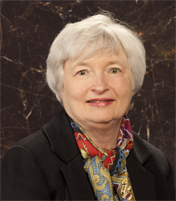
Janet Yellen arguably becomes the most powerful woman in the world on Saturday, when she takes over as “Chairman” of the Federal Reserve. Take five minutes and get to know a little about her.
The running joke about economists is that they equivocate on every question, answering always with a phrase like, “One the one hand….but on the other hand.” So it’s only fitting that a story about the impact of Janet Yellen’s confirmation as Fed chair this Monday follows this time-tested formula. On the one hand, things won’t change much from Ben Bernanke’s reign. On the other hand, she’s quite possibly a revolutionary figure.
The first job of any new Fed chair is to avoid spooking the stock market; she’s already accomplished that. Wall Street has largely cheered her selection, and cheered even more during her November nomination hearings, when she pledged allegiance to Bernanke’s monetary policy. After all, she spent three years as Bernanke’s No. 2. Traders hate surprises; clearly they liked the Yellen choice. So, on the one hand, expect a smooth transition and little change at the helm of the economy.
But on the other hand, Yellen, 67, is the first of her kind in many ways to run the Fed — the list only begins with her being the first woman in the job. Given her past positions, it’d be shocking if she doesn’t stir the pot after she takes charge Feb. 1.
A quick read of Yellen’s academic work shows she is the first Fed chair to really embrace to relatively new field of behavioral economics, which melds psychology and old-world econ. Classical economists have long snickered at the behaviorists, so Yellen’s role atop the financial world is a bit of revenge for the newbies.
To consumers, that means Yellen will almost certainly be more sympathetic to real-world issues than traditional economists, such as the pain and suffering caused by boom-and-bust cycles. In an early paper, she argued against traditional ideas that booms and busts are natural and balance each other. She has also taken positions that workers might cheer, composing an elegant argument that companies profit from paying workers more – unpaid workers underperform, the paper says. She penned a pro-consumer paper explaining that bundling of services often works to the advantage of sellers, deceiving buyers about the real price of things. Consumers frustrated by high cable TV prices or unfair costs of printer ink would probably find an ally in her logic. She even wrote a paper about the problems of advertising – how it empowers monopolies, how it creates unhealthy demands, and generally how it distorts an economy.
For a fantastic summation of Yellen’s academic work, see this Washington Post story.
Meanwhile, Yellen was born in Brooklyn, but she did not ride the usual New York-Washington D.C. shuttle. She spent six years running the San Francisco Fed, far from Wall Street, and has no obvious allegiance to stock marketeers.
Observers say Yellen, while an avid consumer of data, shows more human concern for unemployment than other economists, who tend to think about such statistics in abstract ways. Indeed, while abiding by the oft-repeated mantra that the Fed’s dual job is to control inflation and unemployment, she’s already said that she’s more concerned about American’s long-term unemployment than short-term inflation increases. She’s expected to use the bully pulpit of the Fed to argue for higher minimum wage, for example.
None of this will be apparent at the beginning of Yellen’s term, when she will be dealing with a hot potato — winding down the Fed’s quantitative easing policy, which has seen the U.S. government buying securities by the billions to prop up market prices. QE, as it’s known, was instituted after interest rates were dropped near zero as a last-resort method for stimulating the economy. Observers have long warned that the years of easy money has set the U.S. up for high inflation in the future. Unwinding these policies began in December, when the Fed announced it would slowly begin buying fewer securities. Yellen’s job will be to execute a soft landing…ease off the purchasing, and perhaps slowly raise rates, while keeping Wall Street happy on the one hand (here we go again) and stemming inflation the other. And she’ll be doing that in a more hostile environment than any Fed chair in recent memory — she received fewer confirmation votes on Monday that Bernanke or Greenspan, and Congress is vowing to push forward with efforts to gain more oversight of the Fed.
Meanwhile, Yellen has argued for more oversight of Wall Street and of banks, worrying publicly several times in recent years that reform hasn’t gone far enough. On the one hand, you’d think that Wall Street would be worried; but on the other hand, have you seen the Dow lately?
Read the rest of this story at Credit.com
Sign up for Bob Sullivan’s free email newsletter.
Follow Bob on Facebook | on Twitter

Be the first to comment